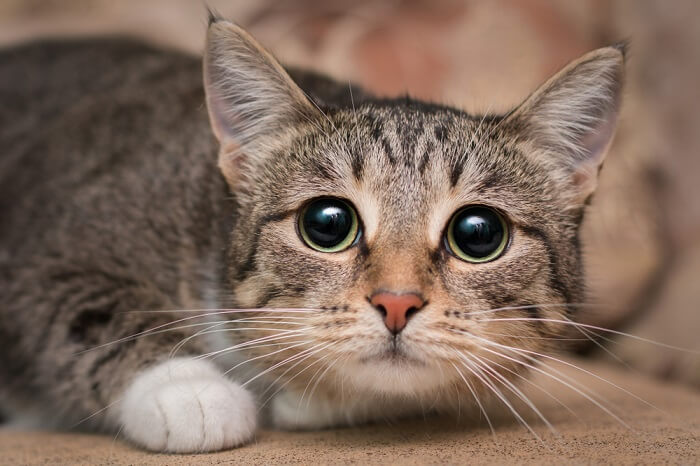While most pet parents want to treat their cats well and rarely intentionally do things that stress their cats out, the fact is that humans often unknowingly do things that cause stress to cats. Here are the top ten things that cats hate that can cause stress, and how to mitigate or avoid these issues altogether.

- Loud Noises
Loud noises make cats very nervous for very good reasons: in nature, loud noises can indicate a dangerous predator that could potentially ruin a cat’s day. When a cat hears a loud noise it activates the part of their brain that governs the fight, flight, or freeze response.
This can result in increased aggression towards people or other pets, skittish behavior, loss of appetite, over-grooming that can result in bald patches, or litterbox problems.
- Dirty Litterboxes
Litterbox problems (i.e. not using it and instead going somewhere else in the house) are some of the leading reasons why cats are relinquished to shelters. When it comes to toilet hygiene, cats like it squeaky clean and not fancy.
Dirty or crowded litterboxes can lead to stress in cats, which can manifest as inappropriate elimination, i.e. urinating and/or defecating outside the litterbox, probably where you don’t want them to go.
Scoop the box daily removing any feces and clumped urine, refresh the litter every 2-3 days, and keep it deep enough so that the cat can scratch and cover feces.
- Litterbox Accoutrements
Hoods, lids, plastic liners, electronic scooper thingies – at the end of the day, we buy all this stuff for ourselves. The hard truth is most cats hate fancy litterboxes and prefer a plain, quiet box located in a low traffic area to all the bells and whistles any day.
If you have a fancy litterbox don’t despair – just get an additional plain box that has low sides and let your cat make the choice themselves! In addition, cats don’t love fancy scented litter, they prefer fine sandy unscented clumping litter.
One more pro tip: many people keep the litterbox in near the furnace or boiler. Most cats don’t really like that, so if your cat is having litterbox issues, try moving the box!
- Petting in the No-No Zone
While there are always exceptions to the rules, in general, cats don’t like belly rubs or petting on the sides of their abdomen. The reason for this is these areas feel very vulnerable to cats, who are both predator and prey in nature.
Cats will tell you they don’t like something if they start swishing their tail, have dilated eyes (their eyes look more black) or they start growling during a petting sesh. Cats prefer rubs around their head and neck, and some like long strokes down their back that end at the base of the tail.
- Bathing
There is that one cat that one time on the internet that everybody talks about because it loves laying in a sink with the water turned on, but in general, cats don’t like getting wet.
Bathing can be very scary to cats, and furthermore, fur that is weighed down by water can feel very strange to cats and they don’t appreciate it. While you can train a cat to tolerate bathing and water, if they don’t like getting wet, don’t force the issue with them.
- Medicine
Some medicines can even be formulated into a transdermal lotion that you can rub into your cat’s ear during your daily cuddle sessions. Other medicines can be delivered via a single long lasting injection that is delivered by your vet so they are the bad guy instead of you.
If your cat needs medicine, ask your vet for formulation options that will preserve the relationship between you and your cat by making it easier and more enjoyable. If you do have to give your cat a pill, follow up with syringing a small amount water in their mouth after you give them a pill to avoid the pill getting stuck and causing inflammation in the esophagus.
- Stray Cats
This stress can manifest in several ways, from increased displaced aggression on other cats or people in the household, to howling or overgrooming, to loss of appetite, to spraying and litterbox problems.
You can reduce this stress by utilizing calming feline pheromone sprays like Feliway, utilizing remote devices that discourage cats from entering your yard, and calling animal control to come pick up feral stray cats.
- Cat Carriers
Ways to do this include leaving the carrier open around the house so your cat can investigate it, putting food, toys, water, or treats in the carrier, conducting short practice sessions where you carry your cat in the crate or put the crate in the car.
Always build a positive association with your cat and the carrier, that way when the cat has to be transported in the carrier, it doesn’t create an additional source of stress.
- Car Rides
To reduce distraction or the possibility of your cat getting lost if you open a door, do not let your cat wander around the cabin when the car is in motion.
- Change
Cats are like humans in one way: they don’t like change. They like routine, they like the same food, the same treats, the same people and pets in their environment. Some cats can become very stressed when you have visitors in your home, during renovation, when you change their food, litter types, box locations, etc.
Stressed cats let us know how they feel by eliminating outside the litterbox, hiding more, trying to escape more, increased aggression, changes in appetite, changes in grooming, or personality changes.



